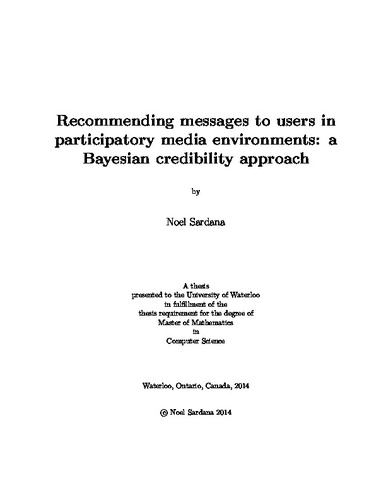| dc.description.abstract | In this thesis, we address the challenge of information overload in online participatory messaging environments using an artificial intelligence approach drawn from research in multiagent systems trust modeling. In particular, we reason about which messages to show to users based on modeling both credibility and similarity, motivated by a need to
discriminate between (false) popular and truly beneficial messages. Our work focuses on environments wherein users' ratings on messages reveal their preferences and where the trustworthiness of those ratings then needs to be modeled, in order to make effective recommendations.
We first present one solution, CredTrust, and demonstrate its efficacy in comparison with LOAR --- an established trust-based recommender system applicable to participatory
media networks which fails to incorporate the modeling of credibility. Validation for our framework is provided through the simulation of an environment where the ground truth of the benefit of a message to a user is known. We are able to show that our approach performs well in terms of successfully recommending those messages with high predicted benefit and avoiding those messages with low predicted benefit.
We continue by developing a new model for making recommendations that is grounded in Bayesian statistics and uses Partially Observable Markov Decision Processes (POMDPs). This model is an important next step, as both CredTrust and LOAR encode particular functions of user features (viz., similarity and credibility) when making recommendations; our new model, denoted POMDPTrust, learns the appropriate evaluation functions in order to make ``correct" belief updates about the usefulness of messages. We validate our new approach in simulation, showing that it outperforms both LOAR and CredTrust in a variety of agent scenarios. Furthermore, we demonstrate how POMDPTrust performs well against real world data sets from Reddit.com and Epinions.com.
In all, we offer a novel trust model which is shown, through simulation and real-world experimentation, to be an effective agent-based solution to the problem of managing the messages posted by users in participatory media networks. | en |

